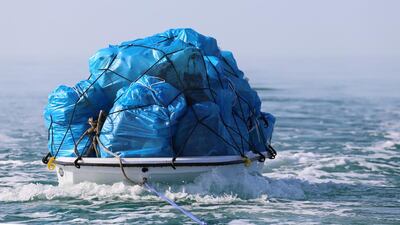Plastic waste is accumulating in UAE waters and threatening animals and birds, campaigners say.
Single-use plastic water bottles are among the most common items of debris, said Kathleen Russell, Professional Association of Diving Instructors course director at Desert Islands Watersports Centre on Sir Bani Yas Island and at Al Mahara Diving Centre in Abu Dhabi.
Mrs Russell, who has been organising underwater clean-ups since the 1990s, has seen the same problem when camping in the desert, and while the debris is harmful for both terrestrial and marine creatures, it is more difficult to remove from the ocean.
The rubbish is injuring turtles and marine birds who mistake it for food or become entangled in it, said Shamsa Al Hameli, co-founder of the Abu Dhabi Marine Conservation Group.
The issue, she said, is “critical” on many remote islands in the Western Region of Abu Dhabi, where waste is carried by underwater currents.
“You can see it has accumulated over the years because, some of it - when you touch it - dissolves in your hand,” said Ms Al Hameli.
Two years ago, she and members of her family removed a boatload of rubbish from a small island near the town of Mirfa.
“We went there recently and it was as if we never cleaned it,” she said.
The sources of the pollution vary. Careless fishermen and pleasure boating crews sometimes toss their waste overboard and so do those on large commercial ships, said Ms Al Hameli, who lists water bottles with stickers in Chinese and Farsi as some of her most notable finds.
Once, she even came across bags of plastic pellets - used to make various plastic goods - washed ashore on an otherwise pristine island.
The problem is not limited to the UAE and is a global issue, said Joanna Ruxton, a wildlife film producer whose movie Plastic Ocean is set for release early this year. She filmed in a number of locations including an area at the centre of the North Pacific known as the Great Pacific Garbage Patch, where the elements have cut the plastic into tiny pieces. The plastic pieces are the size of plankton and are being eaten by fish and birds.
“If we do not get our addiction to single-use plastics under control, that to me was like a premonition of what the whole planet is going to look like,” she said.
newsdesk@thenational.ae

